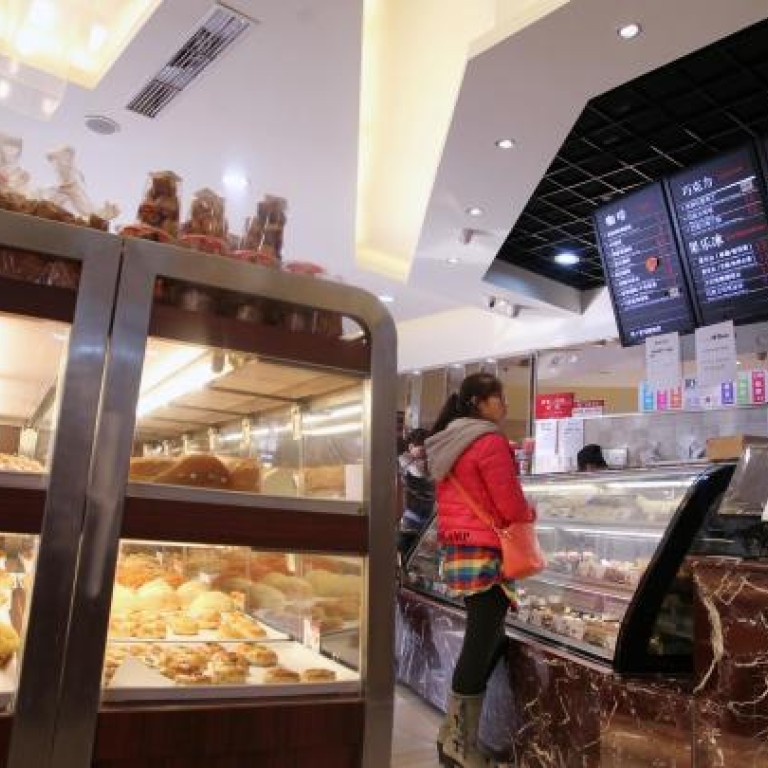
Taiwan cafe chain hits the spot on mainland
Unique chain 85C plans to ramp up expansion across the strait with 100 new cafes a year as consumers fall in love with its quirky tastes
A cafe chain legendary for unusual recipes in Taiwan, its home market, plans to grow by 100 outlets a year on the mainland as a faster pace of life draws more people to pastries, coffee and takeout food.

Wu Cheng-hsueh, chairman of Taipei-listed parent company Gourmet Master, wanted to open 100 new mainland cafes per year until he turns 50 in 2017, his spokeswoman said. The mainland contributes 70 per cent of the chain's total annual revenue of NT$11.4 billion (HK$3.03 billion) despite competition from Starbucks and McCafe.
"Why business here is better than in Taiwan is social development, meaning the pace of life has quickened," 85C's mainland spokesman, Wu Yanghan, said. "We have a positive outlook on [the mainland] market. People's spending power is getting better and better, meaning our proceeds can become increasingly stable."
Spending power is forecast to strengthen overall to 2020 as mainland leaders seek to meet outgoing Communist Party chief Hu Jintao's goal of doubling average incomes by that year, which he announced at the party congress on November 8. The average annual income now is US$4,940.
Rapid growth on the mainland is a common story for offshore investors, but 85C's formula differs from that of its peers in other fields. Faced with a large yet increasingly crowded cafe market, 85C designs outlets to look like bakeries instead of coffee houses.
The chain, known for its fast-changing menu, bakes cakes and pastries on site and comes up with oddities such as Caesar salad-flavoured bread, and coffee with a sea salt-enhanced foam. Recipes also change about 10 times per month, which appeals to the quick evolutions of taste among urban mainland consumers.
To get food fresh, Wu said, mainland clients often called ahead to reserve what they wanted for their commutes or for dropping children off at school.
Those with the time to take a seat found ample space, as 85C outlets usually took up 170 to 200 square metres, he said.
"Customers in mainland China feel the same way about us as we would feel about Starbucks in Taiwan," the chain's Taiwan-based spokeswoman, Kathy Chung, said. "Our stores there feel like bright bakeries. For them, the Taiwan flavour and business model are very novel."
Taiwan's cafes are smaller, sometimes just a small corner lot in crowded Taipei, and run on sales of coffee.
Taiwanese cafe-goers also pack Starbucks, which operates 233 outlets on the coffee-crazed island, despite higher-than-normal drink prices, for interior designs that customers say promote socialising or people-watching.
The first 85C cafe on the mainland opened in Shanghai in December 2007. Today each outlet on the mainland had about 1,000 transactions per day, Wu said. The mainland stores employ a combined 18,000 people. About 900 to 1,000 people per day visit the original Shanghai cafe.
Locally owned cafe chains covering small tracts of the mainland, other Taiwanese-invested drink sellers and 64-year-old Yamazaki Baking of Japan were putting the most pressure on 85C's mainland business, Wu said.
His company must also vie with Starbucks and its chief mainland rivals, the British-owned Costa Coffee and the fast-expanding, lower-priced McCafe shops of McDonald's.
The Asia-Pacific president of Starbucks said in April that the Seattle-based chain would operate more than 1,500 stores in China by 2015, second only to the total in the United States.
For now, it's unlikely anyone will need to turn down the heat.
"China is becoming more Westernised, if you want to put it that way," said Buck Pei, associate dean of Asia programmes at the W.P. Carey School of Business at Arizona State University in the United States. In the same vein, he notes China's fascination with KFC and ready-to-eat food sold in local supermarkets.
"Anything to do with food and drinks will do well as long as China's GDP does well," Pei said.

